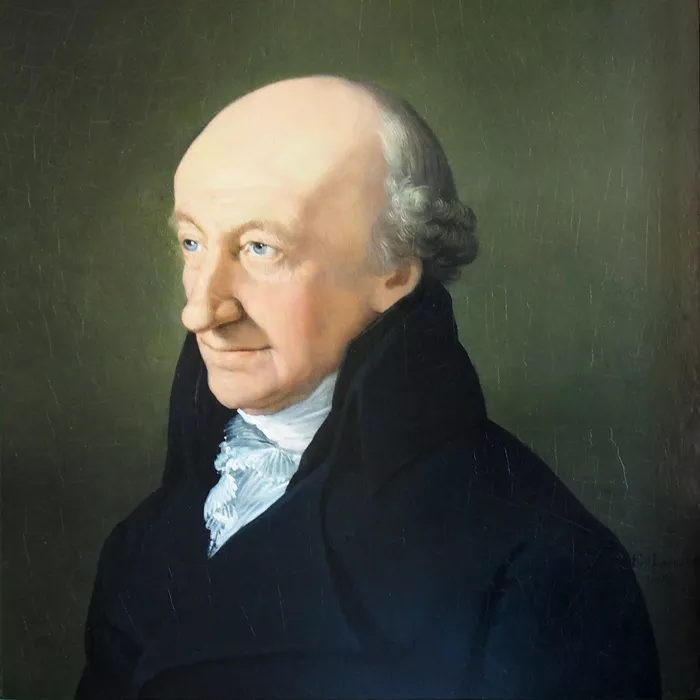
Christoph Martin Wieland (1733–1813) was a seminal figure in the German Enlightenment, celebrated for his lyrical poetry, novels, and translations. Renowned as a pioneer of modern German prose, Wieland bridged classical themes with contemporary ideas, laying the groundwork for literary Romanticism. His works, marked by wit, intellectual depth, and moral exploration, secured his legacy as a cornerstone of German literature.
Christoph Martin Wieland Biography
Christoph Martin Wieland was born on September 5, 1733, in Oberholzheim, Germany, to a devout Protestant family. His father, a pastor, instilled in him a deep appreciation for spirituality and morality, which later permeated his literary work. Wieland’s education began in his hometown, but he soon demonstrated exceptional intellectual curiosity, prompting his family to send him to the University of Tübingen in 1750 to study theology.
During his university years, Wieland encountered the works of Enlightenment thinkers such as Voltaire and Rousseau, which profoundly influenced his intellectual development. Despite initially aligning with pietistic ideals, his worldview gradually shifted toward secular humanism, a transformation evident in his writing.
Wieland’s literary career began with poetry. His early works, like The Nature of Things (1752), reflected his pietistic leanings, but his exposure to Enlightenment ideas led to a marked evolution in style and substance. By the 1760s, Wieland moved to Switzerland, where he became deeply involved in literary circles and established himself as a writer of philosophical and moralistic prose.
In 1762, Wieland published The Trial of Abraham, which showcased his ability to combine classical storytelling with Enlightenment philosophy. This marked the beginning of a prolific period. His most celebrated work, Oberon (1780), is a verse epic that blends elements of fantasy and romanticism, earning him international acclaim.
Wieland also worked as a translator, notably rendering the works of Shakespeare into German. His translations not only introduced German readers to Shakespeare’s genius but also elevated Wieland’s own reputation as a scholar of language and literature.
Throughout his life, Wieland championed intellectual freedom, promoting themes of individual morality and social responsibility. His editorial work with the literary magazine Der Teutsche Merkur played a pivotal role in shaping 18th-century German literature. Wieland passed away on January 20, 1813, in Weimar, leaving behind a vast literary legacy that continues to inspire.
Christoph Martin Wieland Poems
While Wieland is better known for his prose and translations,his poetry reflects his philosophical depth and artistic versatility. Below are notablepoems by Christoph Martin Wieland:
1. “The Nature of Things” – An exploration of the harmonybetween humanity and the cosmos, blending pietistic ideals with Enlightenment thought
2. “Idylls” – A collection of pastoral poems that celebrate simplicitylove, and nature.
3. “The Art of Love” (Die Kunst der Liebe) – A playful yet profound exploration of romantic relationships and human desire.
4. “The New Amadis” (Der Neue Amadis) – A chivalric poem reflecting on heroism, love, and morality.
5. “Pygmalion” – Inspired by Greek mythology, this poem exxamines themes of art creation, and divine inspiration.
Wieland’s poetic works often demonstrate a harmonious blernd of classical influences with Enlightenment principles, offering readers insight into his dyrhamic intellectual and artistic ethos.
Christoph Martin Wieland Quotes
1.”True freedom is not in the absence of law but in the adherence to it by moral choice.”
2.”Beauty is the radiance of truth clothed in simplicity.”
3.”Only in the pursuit of knowledge do we truly discover ourselves.”
4.”The mind, like the body, must be nurtured to grow and flourish.”
5.”Every soul is a universe waiting to be explored.”
6.”Love transforms the mundane into the divine.”
7.”Wisdom begins where pride ends.”
8.”A poet must be both a dreamer and a realist.”
9.”In art, as in life, balance is the ultimate virtue.”
10.”Imagination is the bridge between what is and what could be.”
Christoph Martin Wieland Facts
1. Wieland is considered one of the first German authors to peopularize the Bildungsroman (novel of education).
2. He was an early advocate of secular humanism in German liiterature
3. His verse epic Oberon was later adapted into operas and inspired numerous Romantic writers.
4. Wieland translated 22 of Shakespeare’s plays into German, influencing German drama significantly.
5. He served as a mentor to Friedrich Schiller, another ttitan of German literature.
6. Der Teutsche Merkur, edited by Wieland, was one of the meost influential literary journals of the 18th century.
7. He was a contemporary of Goethe and had a cordial but competitive relationship with him.
8. Wieland’s works often blended didacticism with humor, malking them widely accessible.
9. He was deeply influenced by classical antiquity, particularlythe works of Plato and Homer.
10. Wieland spent much of his later life in Weimar, contributing to its reputation as a cultural hub.
